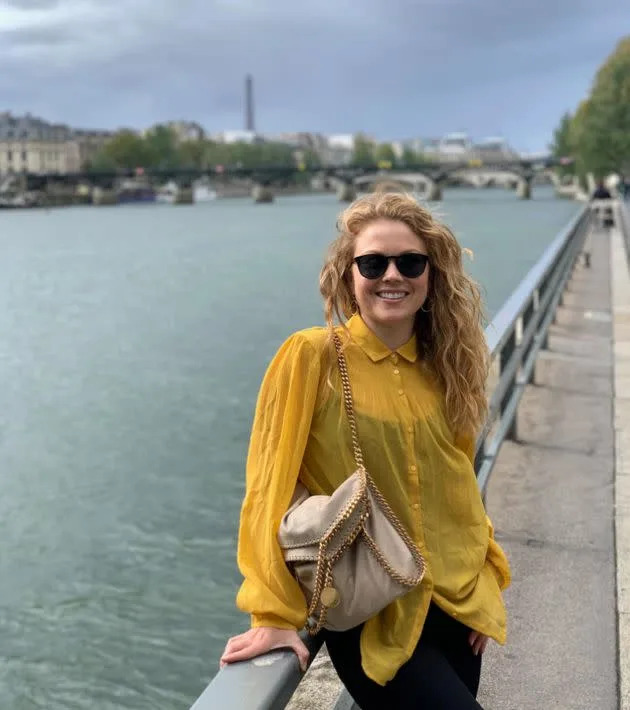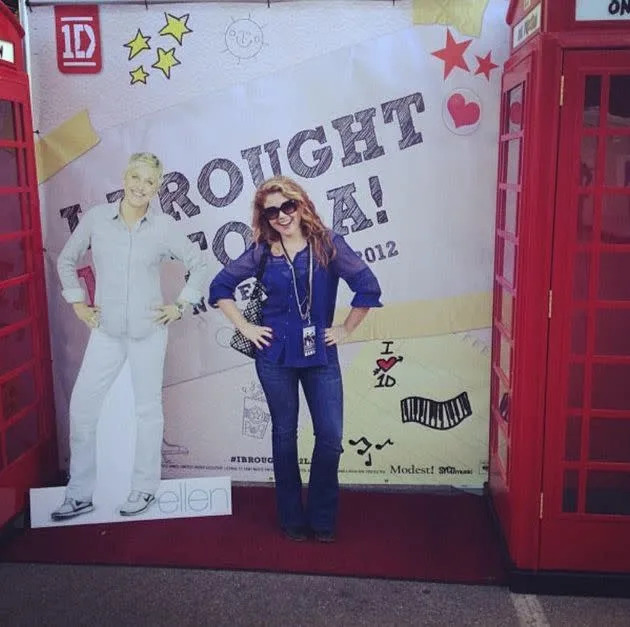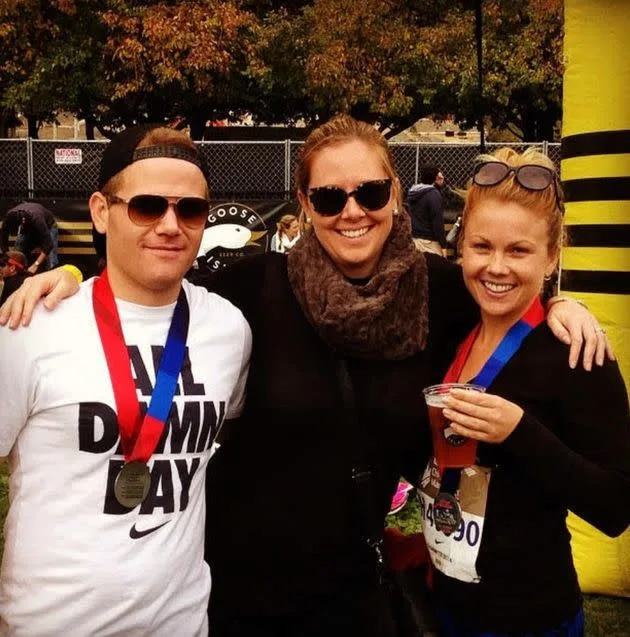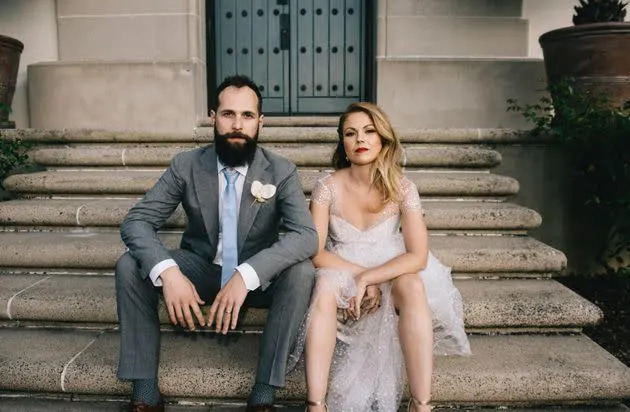I Inadvertently Became Instagram Famous. Here's Why I Finally Decided To Walk Away.
Claire Cook
Sun, 6 March 2022, 10:00 pm·7-min read

The author in Paris, France. (Photo: Courtesy of Claire Cook)
I didn’t fall into Instagram the way that most people did. I joined a decade ago when I was 25 and doing the marketing for One Direction’s first album release in the U.S. The group was on tour with the Nickelodeon boy band Big Time Rush and Teen Vogue wanted backstage photos for a tour diary.
I didn’t really understand how Instagram worked, so I started an account and took intimate photos of the band in their dressing room, on their tour bus, and at album signings, which I then sent to Teen Vogue. I didn’t realize that One Direction’s incredibly passionate and digitally savvy fanbase would see that I had taken them, find my personal Instagram account and then follow me. But find me they did.
Suddenly, my private account, which I thought no one could see, became a destination for thousands of tween and teen girls. As a child, I was bullied for being smart, chubby and awkward, so it felt really validating to be seen as someone on the inside of what was becoming a huge pop phenomenon. A hashtag made up of my name, #clairecooks, even became a worldwide trending topic on a rival social media platform.
This is how my Instagram addiction began.

The author's first Instagram post, which featured a set list from one of One Direction's shows on their first U.S. tour. (Photo: Courtesy of Claire Cook)
Soon, I was relying on Instagram to feel cool and worthy ― and, oh, did it ever make me feel cool and worthy.
I now realize I have used Instagram to validate my existence during every phase of my life since One Direction’s first tour. When I moved from New York City to Los Angeles, I wrote a Los Angeles Times article about the guys I dated in Hollywood. I posted about the article on Instagram to prove to the guys in the article that I was independent and didn’t need them to be happy (while I secretly obsessed over the likes it got to see if any of those guys acknowledged my post).
Later, the likes I got on a photo of me after I completed the Chicago Marathon felt more thrilling than running the fucking marathon itself. When I left LA and changed careers, I documented my new life as a yoga teacher and nonprofit marketer to prove to the world that I had gone from being “cool” to “good.”
I hired a friend who is a rock ‘n’ roll photographer to shoot my wedding to ensure that the photos were iconic and worthy of “the gram.” The likes and comments on my wedding photos made me believe that all this approval meant I was worthy of love — as if marrying my husband wasn’t enough to tell me that!

The author celebrating One Direction's second album release. (Photo: Courtesy of Claire Cook)
My relationship with Instagram started to shift during the pandemic. After the initial discomfort of the first month of lockdown, I started to do some soul-searching and I found myself turning inward in hopes of getting comfortable with who I really am. I took long walks in the woods without my cell phone and often found myself enjoying the peace I discovered when I was hiking or lying on the ground, looking up at the sky.
I also started talking on the phone with friends and family and strengthening these relationships helped me understand the difference between real, vulnerable and meaningful connections and the mostly two-dimensional, voyeuristic relationships I had created on Instagram. I started to realize that I really liked myself ― not because of my job, or my vacations, or the brand identity I had created for myself online, and certainly not because of the attention any of that got me ― but as the woman I truly am.
I constantly thought about quitting Instagram over the last two years, but finally decided to just delete it from my phone and try taking a couple months away from it ― similar to how I had tried and loved doing “dry January” as a way to rethink and reset my relationship with alcohol.
With Instagram no longer at the forefront of my mind, I became more intentional about how and when I used the app, like when I posted I’d be moving from San Francisco to NYC and was looking to connect with old friends in the city. Or when I made a post encouraging people to support the environmental nonprofits I volunteer with. I felt better about how I was using the app, but I also noticed those posts didn’t get nearly as much attention as the ones I used to share about my successes or the photos of me that required 50 takes to get just the right angle to look fit and sexy.

The author, right, with her brother and cousin after completing the Chicago Marathon. (Photo: Courtesy of Claire Cook)
Taking a step back made me realize how much time and energy and effort I was putting into a platform that ended up filling my stomach with anxiety-fueled butterflies and more often than not induced feelings of longing and inadequacy. My relationship with Instagram was toxic.
This became even clearer to me in October 2021 when my husband and I took our first vacation since the start of the pandemic. Despite my Instagram break, I found that the photos from my trip were taken with the app in mind. Although our vacation was fun and relaxing, I came home feeling disappointed that I hadn’t been fully present because I was constantly staging pictures to get likes.
I finally had enough of Instagram in November when I was planning a safari. Instead of being excited for all of the incredible things I was going to get to see and do, I found myself planning out photo shoots to post. I was disgusted with myself and that was the last straw. I knew it was time to quit Instagram for good.
Instagram makes you wait an entire month after you delete your account before they permanently erase it. The company sent multiple emails asking me, “Are you sure?” To be honest, I still wasn’t sure. I continuously asked myself, can I really do this? And will I still have friends after this? while I waited for the month to end. However, as uncertain as I was, I stayed strong. At the start of 2022, my account was finally gone.

The author and her husband on their wedding day.
It’s been three months since I left Instagram and I don’t regret it. I feel more confident and present than I did when I had it, and my free time is much more productive. I still have friends that use the platform as a source of education and connection ― from learning about mental health to fitness to motherhood to cooking ― and find great joy and meaning from the interactions they have on it. And that’s great. Other friends rely on the platform for their livelihoods, and I’m glad it helps them provide for themselves and their families. If it truly makes people happy, then that’s all that matters. But I do worry about the mental and emotional cost that Instagram can have on us, especially after reading recent reports on the platform’s negative influence on young women.
On a larger scale, I worry about the effect that any social media platform can have on us. My issue was with Instagram specifically, but it’s obviously not the only app that people use ― or that makes them feel bad about themselves. Maybe we need to take a long, hard look at the things we desire, the ways in which social media helps us get them ― or doesn’t ― and just how healthy it is for us. In the same way that many addictive products carry surgeon general warnings on them, I wonder if there’s a future where social media platforms include a mental health warning every time someone logs in. I don’t think it’s ever a bad idea to be prompted to take a step back and ask, “Is this really good for my health and well-being? And if so, why? And if not, why not?”
And, of course, that can change over time. Maybe in a year or two or 10, I’ll want to try Instagram again. Perhaps I’ll approach and use it differently and because of that, it’ll feel better or be more useful. All I know is that right now I feel worthy of existence just as I am, whether or not anyone gives me a “like” or just plain likes me.
Claire Cook lives in Brooklyn, New York, with her husband and dog. During the day, she is a brand marketer with over a decade of b2b and b2c experience marketing to audiences that range from teenage girls to parents to Fortune 500 CIOs. Her writing has been featured in LA Times, HuffPost and the award-winning corporate blogs for Atlassian and Trello.
